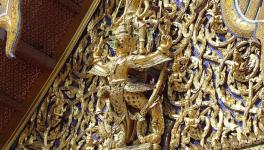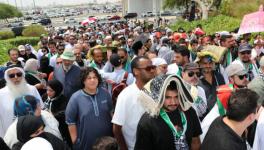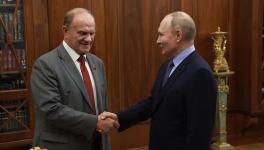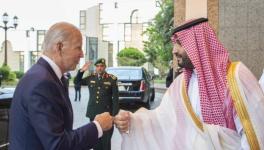US Sectarian Policies Behind ISIS' Rise
The rapid advance of the ISIS (Islamic State of Iraq and Syria), with the fall of Mosul on June 10th, brings out the utter failure of US policies in the region and the terrible cost that people are paying there. The 2003 invasion of Iraq and the US policy of stoking sectarian fires has now lead to a sectarian civil war and a virtual break-up of Iraq on sectarian lines, with the Kurds, the Sunnis and the Shias all having their own non-viable statelet. It is the same cynical policy that the US and its allies have pursued in Syria as well, with the difference that they support Sunni sectarian forces in Syria while supporting the Shia sectarian regime of al-Maliki in Iraq.
Elija JM reports his interview with Abu Baqr-al-Janabi, an ISIS commander. Abu Baqr says, “Prior to 2003, there was no such a thing as Sunni and Shia in Iraq. The Americans have managed to divide us. It is too late now.”
The US and its allies have been against secular, nationalist politics in the region and have always supported forces of Islamic fundamentalism – be it against Nasser (Egypt), Hafez al-Assad (Syria) earlier and later against Saddam Hussein, Gaddafi and Bashar al-Assad. This was the basis of their alliance with Saudi Arabia and the reactionary Gulf monarchies. It is the same politics that lead to the US supporting armed Islamic militancy in Afghanistan against the progressive Tarakki government in 1979, even before the Soviet intervention.
The results today are visible – it has destroyed a huge stretch of land – spanning from Afghanistan to Somalia and Nigeria -- with failed states and sectarian civil wars. The Islamic fundamentalists who were minor players then, now control large territories and are a threat to at least a dozen countries.
This has not stopped the US and its destructive tryst with Islamic terror. Even today, the US is funnelling a large amount of arms to the Syrian rebels who have deep ties with the ISIS. The ISIS, a moribund movement in 2009, got a new lease of life due to US attempts to overthrow Assad using takfiri terrorist groups in Syria. Along with the US, its allies- the Gulf monarchies, Saudi Arabia, Qatar and Turkey have been providing arms, money, training and safe passage to the salafi/takfiri extremists in Syria, such as ISIS, al-Nusra and others.
The ISIS not only gained strength from its intervention in Syria, it got arms, new recruits and money, all of which allowed it to gain ground in Iraq. In the beginning of the year, they took over parts of Anbar province including Fallujah. They were joined by other forces including the Naqshbandis, a sufi order but consisting largely of ex-Ba'athists. It is led by Ibrahim al-Douri, a former vice-president of Iraq under Saddam. Clearly, al-Maliki's sectarian policies, which excluded the Sunnis from the power structure of Iraq, has alienated his government from the people in the Sunni areas. It is this popular anger against Maliki that has made it possible for much smaller forces of ISIS and Naqshbandis to rout the much larger forces of the Iraqi government. If the people of Mosul had also not risen in support, a force of 2,500 of ISIS and its allies could not have defeated 50,000 government troops in Mosul,.
Will this alliance of Islamic fundamentalists with sufi Ba'athists hold? Already, there are reports that there have been clashes over who controls the oil from the parts they have occupied. The Ba'athists may also not like the kind of Sharia regime that is being imposed in the ISIS occupied areas and the mass executions that ISIS is carrying out. They are fundamentally incompatible forces, brought together by the al-Maliki government that has systematically kept the Sunnis out of any role in the current government.
There is no question, just as conquests in Syria helped ISIS to grow, the seizing of a large part of Iraq will increase their military strength in Syria. Bashar al-Assad and his forces were clearly on top; with the arms, money and transport – spanking new Humvees that the Iraqi government forces abandoned -- the ISIS will now be a much bigger problem for the Assad forces.
The threat of ISIS is not only for Iraq and Syria. The area that they now control abuts Jordan. They might find Jordan a much softer target than the Shia areas of Iraq. And if they make a dash for Amman, will the unpopular Jordanian regime be able to hold? How much of the old order including the Gulf monarchies will survive if the ISIS targets them? Has Saudi Arabia and Turkey got on to a jihadist tiger which will not be easy for them to dismount?
We in India face thousands of our – by some estimate more than 20,000 – trapped in the Iraq fighting. They include construction workers in Mosul and nurses in Tikrit.
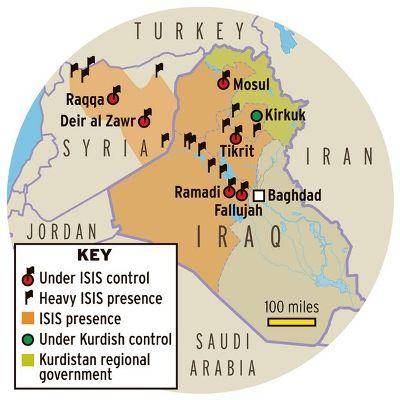
Courtesy: Mirror.co.uk
The only way for the region to be free of such destructive forces is for the US to leave this region. Without this step, the region cannot be free of sectarian strife. The US is the main supporter of sectarianism of all varieties. Simultaneously, countries such as Saudi Arabia, Qatar, Gulf monarchies and Turkey must stop their support to armed rebels in Syria and Iraq. The peace loving people in the region – and the world – must come together to raise their voices for peace in the region and oppose the destructive course adopted by the US and its allies.
Disclaimer:The views expressed here are the author's personal views, and do not necessarily represent the views of Newsclick.
Get the latest reports & analysis with people's perspective on Protests, movements & deep analytical videos, discussions of the current affairs in your Telegram app. Subscribe to NewsClick's Telegram channel & get Real-Time updates on stories, as they get published on our website.















